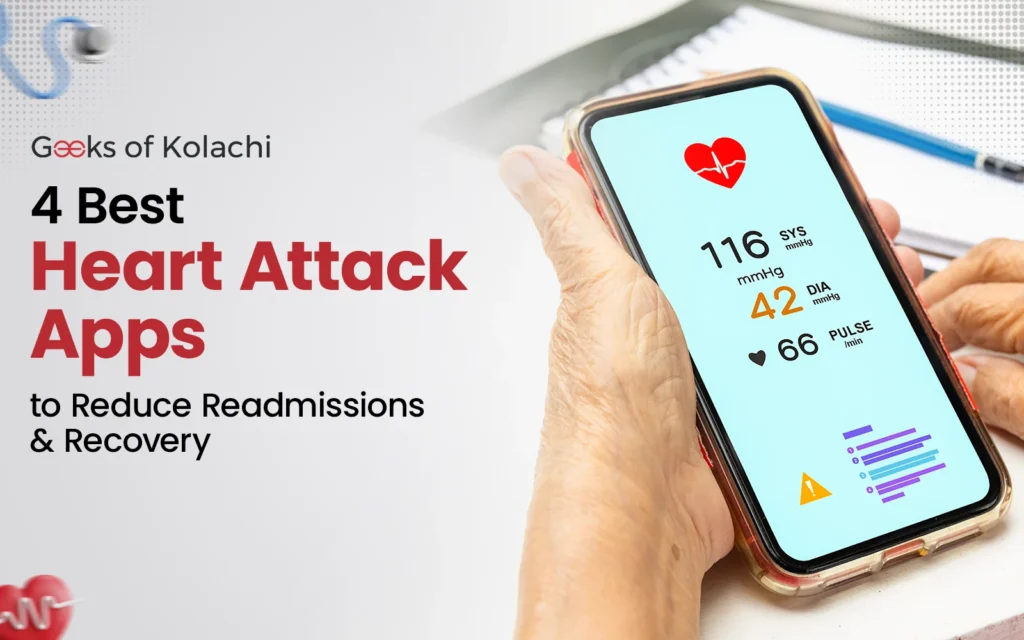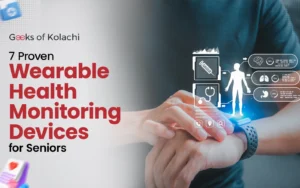
4 Best Heart Attack Apps to Prevent Readmissions & Boost Recovery
Heart disease remains one of the leading causes of death globally, and heart attacks, in particular, are responsible for a large number of hospital readmissions. As healthcare continues to evolve, technology plays a significant role in improving patient outcomes and reducing these readmissions. Today, many patients are turning to a heart attack app—a digital tool that helps monitor vital signs, track recovery, and prevent future complications.
These apps can empower heart attack survivors by providing continuous support, immediate alerts, and easy access to crucial health information, all from the convenience of a smartphone. In this blog, we’ll explore the best heart attack apps that are designed to help manage heart health, reduce hospital readmissions, and boost recovery. Whether you’re recovering from a heart attack or simply looking to improve your cardiovascular health, these apps can serve as valuable companions in your journey to better heart health.
Understanding the Importance of Heart Attack Apps
When it comes to heart health, prevention and early detection are key. After a heart attack, patients often face a higher risk of readmission due to complications like arrhythmias, high blood pressure, or fluid retention. Heart failure apps offer a practical solution by providing continuous monitoring of vital signs such as heart rate, blood pressure, and even ECG readings. They help patients track their health in real time, offering them a way to detect any changes before they become serious.
But these apps do more than just monitor—many include features like medication reminders, fitness tracking, and even emergency alerts, all aimed at making self-management easier. Whether you’re a heart attack survivor or someone at risk, these apps can provide peace of mind and a way to stay connected to your health and healthcare providers.
In this digital age, the role of apps in health management cannot be overstated. To understand the broader impact, it’s useful to consider insights from the World Health Organization’s overview on cardiovascular diseases which highlights the global burden and the importance of preventive care.
Let’s explore how these apps are helping to transform heart health management, reduce readmissions, and improve recovery outcomes.
How Heart Attack Apps Help Reduce Readmissions
Heart attack readmissions are a significant concern for healthcare systems, but the good news is that heart attack apps can play a pivotal role in reducing these instances. By continuously tracking vital signs and providing immediate feedback, heart failure apps for patients enable them to detect irregularities early. This early detection can prevent complications, avoid emergency situations, and ultimately reduce the likelihood of needing to return to the hospital.
These apps also encourage a proactive approach to heart health by offering features like symptom tracking, daily health logs, and medication reminders. When users stay on top of their medication schedules, monitor their symptoms, and engage in recommended lifestyle changes, they are better equipped to manage their heart health long-term. Furthermore, these apps can alert patients to seek help if their data indicates a potential issue, potentially preventing a serious event like a second heart attack.
By enabling early intervention, an app that detects heart attack supports patients in taking control of their health and reducing the chances of costly and often dangerous hospital readmissions.
If you want to learn more about the risk factors and how heart disease develops, the CDC’s detailed guide on heart disease basics offers comprehensive information that complements the use of these apps.
| Taking control of your heart health is empowering, and with the right tools, you can make a significant difference in your recovery and long-term well-being. If you’re uncertain about which app is the best fit for your needs, our team is here to help. Get in touch with us to discuss your options and receive expert guidance tailored to your unique health goals. |
The 4 Best Heart Apps for Heart Failure Monitoring and Recovery
With so many apps available on the market, choosing the right one can be overwhelming. To make things easier, we’ve selected the top 4 heart attack apps that stand out for their ability to help users manage heart health and reduce readmissions. Let’s dive into these apps and explore what makes each one unique.
-
Heart Attack Detection App
The heart attack detection app is a game-changer in early detection. This app uses real-time heart rate and ECG monitoring to assess whether a user’s heart is experiencing irregularities that could indicate a potential heart attack. With features that include emergency alerts, these heart rate monitor apps ensures users can act quickly if something goes wrong. It’s particularly useful for individuals who are at higher risk of heart attacks due to a family history or existing heart conditions.
One of the standout features of this app is its ability to connect with healthcare providers. The app for heart attack allows users to share their health data with their doctors, ensuring continuous oversight of their condition. This connection ensures that medical professionals can intervene when necessary, potentially saving lives and reducing readmissions.
-
Heart Attack Monitor App
Another powerful tool in heart health management is the heart attack monitor app, designed to integrate with wearable devices like smartwatches or fitness trackers. This app continuously monitors ECG readings, heart rate, and blood pressure, helping users track their vital signs throughout the day. It provides tailored feedback based on the user’s data, including personalized tips for managing heart health.
The app’s ability to sync with wearable technology is particularly beneficial for those who prefer a more hands-off approach to monitoring. Users can receive real-time data right on their devices, while the heart attack application provides automatic updates and health reports. This integration with wearables ensures that users are never too far from the information they need to manage their heart health effectively.
-
Heart Health App
While heart health apps are not always specialized in heart attack recovery, they offer comprehensive features that help users stay on track with their overall cardiovascular health. These apps typically include heart rate tracking, fitness goals, and lifestyle recommendations, providing a holistic approach to heart health.
For those recovering from a heart attack, these apps can be a valuable tool for monitoring daily activities, ensuring that users are staying active, and following heart-healthy routines. Features like step tracking, diet advice, and fitness goals can complement traditional recovery efforts, offering patients a well-rounded tool for improving long-term heart health.
-
Post-Heart Attack Recovery App
The best heart app for monitoring recovery after a heart attack focuses on supporting patients throughout their rehabilitation process. This app features medication reminders, activity tracking, and even education about heart health, all designed to empower patients to make informed decisions about their recovery.
This app excels at providing personalized recommendations based on each user’s health status, ensuring they stay on the path to full recovery. Whether it’s tracking physical activity, setting reminders for medications, or offering heart health education, this app helps patients regain their strength while lowering the risk of future complications.
Key Features to Look for in a Heart Attack App:
When choosing heart apps, it’s essential to ensure they have the necessary features to support heart health management. Here are some key features to look for:
- Real-Time Monitoring: The ability to continuously have a heart tracker to track vital signs like heart rate, ECG, and blood pressure is crucial for early detection of potential issues.
- Emergency Alerts: Apps that send immediate alerts to both users and their healthcare providers in case of abnormalities can help prevent life-threatening situations.
- Medication Reminders: Regular medication schedules are vital for heart attack patients, and having an app that reminds them to take their medication can improve adherence.
- Healthcare Integration: The ability to share health data with doctors or medical teams ensures that patients receive the necessary care based on real-time information.
- Fitness Tracking and Lifestyle Advice: Recovery after a heart attack requires lifestyle changes. Apps that include fitness goals, dietary advice, and exercise plans help users stay on track.
These features ensure that heart attack survivors can actively manage their health, minimizing risks and preventing further complications through such apps for heart monitoring.
Heart Failure Apps: Managing Heart Health Beyond the Attack?
While heart attack apps are essential for monitoring and recovery after an attack, patients who also suffer from heart failure can benefit from additional support. Heart failure apps help manage symptoms, track fluid retention, monitor weight changes, and ensure that users stay on top of their condition. These apps can be particularly helpful for individuals with specific problems and work best as a congestive heart failure app as well as they offer real-time updates on health metrics that are crucial for preventing worsening symptoms.
Whether used in combination with heart attack apps or independently, they help maintain a high quality of life and prevent hospital readmissions due to complications.
If you want to deepen your understanding of heart failure management, the National Heart, Lung, and Blood Institute’s comprehensive resource on heart failure is an excellent reference.
How Heart Attack Apps Work Alongside Traditional Medical Care?
While an app to detect heart attack is an excellent tool for self-management, it should not replace professional medical care. These apps work best when used in conjunction with regular check-ups, allowing users to share their data with their doctors. This collaboration ensures that medical professionals can make informed decisions based on the real-time data provided by the cardiac app.
Using these apps alongside traditional healthcare can result in better heart health outcomes, providing patients with both the tools and the guidance they need for recovery.
For trusted guidance on heart attack symptoms, prevention, and treatment, the American Heart Association’s extensive heart attack resources provide valuable support for patients and caregivers alike.
As you explore options for heart attack apps and digital health management tools, it’s important to work with experienced providers who understand the intricacies of developing custom healthcare solutions. If you’re looking for a partner who can help create custom tools tailored to your unique needs, our custom software development services can help you design a digital solution specifically for managing heart health.
Managing heart health requires more than just an app; it also demands integration with robust healthcare systems. Our comprehensive healthcare software solutions provide seamless integration with existing medical systems, ensuring smooth communication and better care for heart attack patients.
Beyond apps, technology plays a significant role in the overall healthcare system, including streamlining administrative processes like medical billing. If you’re interested in how innovations like AI are improving healthcare efficiency, you can check out our article on how AI is revolutionizing healthcare revenue cycle management and discover how this technology is transforming the way healthcare providers manage billing and reimbursements.
| As you continue your journey toward better heart health, it’s important to have the right support. If you have any questions or need personalized advice on choosing the best heart attack app for your recovery, don’t hesitate to reach out. Contact us today, and we’ll be happy to assist you in making the right choice for your heart health. |
Conclusion
Heart attack recovery and prevention don’t have to be difficult. With the right tools, like the ideal heart attack app, patients can take charge of their health, monitor vital signs in real time, and reduce the risk of future complications. By incorporating these apps into their daily routine, individuals can improve their chances of a full recovery and prevent unnecessary hospital readmissions.
If you’re recovering from a heart attack or at risk of heart disease, consider downloading one of the apps mentioned in this blog to start managing your heart health more effectively today. It’s time to take control of your health and live a life free from the constant fear of heart-related emergencies!
Ready to boost your recovery and heart health? Download one of the best heart attack apps today and take the first step toward a healthier tomorrow!
Frequently Asked Questions
1. How can a heart attack app help reduce hospital readmissions?
Heart attack apps help reduce hospital readmissions by continuously monitoring key health metrics like heart rate, ECG, and blood pressure. These apps provide real-time alerts if any irregularities are detected, allowing users to take immediate action and seek medical help if necessary. Early detection of issues such as arrhythmias or high blood pressure can prevent serious complications, reducing the risk of readmission.
2. What features should I look for in a heart attack app?
When choosing a heart attack app, look for the following essential features:
-
Real-time Monitoring: Continuous tracking of heart rate, ECG, and blood pressure.
-
Emergency Alerts: Immediate notifications to both you and your healthcare provider in case of irregularities.
-
Medication Reminders: Alerts to help you stay on track with your prescribed medications.
-
Wearable Integration: Syncing with devices like smartwatches or fitness trackers for effortless tracking.
-
Fitness Tracking: Options to set fitness goals and monitor activity levels to support recovery.
3. Are there heart attack apps available for both Android and iOS devices?
Yes, many heart attack apps are compatible with both Android and iOS devices. Popular apps such as Cardiio and Heart Pal offer versions for both operating systems, ensuring users on any platform can access the app’s features and manage their heart health effectively.
4. Can a heart attack app detect a heart attack in real-time?
While no app can guarantee the detection of a heart attack in every case, some apps, like the ECHAS app, can analyze heart rate patterns and ECG readings to identify signs that may indicate a heart attack. These apps can provide valuable guidance on whether emergency care is needed, helping you act quickly in a potential emergency.
5. How do heart attack apps contribute to post-heart attack recovery?
Heart attack apps are a valuable tool for recovery by tracking physical activity, monitoring vital signs, and providing educational resources. Many apps, like myHeart, offer personalized rehabilitation programs and help users stay on track with exercise, diet, and lifestyle changes that are important for heart health. Additionally, they enable easy communication with healthcare providers, making it easier to manage your recovery.
6. What is the role of heart attack apps in long-term heart health management?
Heart attack apps are not only useful for post-heart attack recovery but also for long-term heart health management. They provide ongoing monitoring of vital signs, lifestyle tracking, and reminders for medication. This continuous support can help individuals prevent future complications, stay on top of their health, and make informed decisions about their cardiovascular well-being.
7. Can heart attack apps be used alongside traditional medical care?
Yes, heart attack apps work best when used alongside traditional medical care. These apps allow users to share real-time health data with their doctors, ensuring that medical professionals can monitor their condition and intervene if necessary. Using these apps in combination with regular check-ups can improve heart health outcomes and provide a more comprehensive approach to care.
8. Are heart attack apps safe to use?
Heart attack apps are designed with user safety in mind, but it’s important to choose apps that are developed by reputable companies and adhere to privacy and data protection standards. Always check app reviews, ratings, and user feedback to ensure the app is trustworthy. While these apps are helpful tools, they should never replace professional medical advice or emergency care.



















